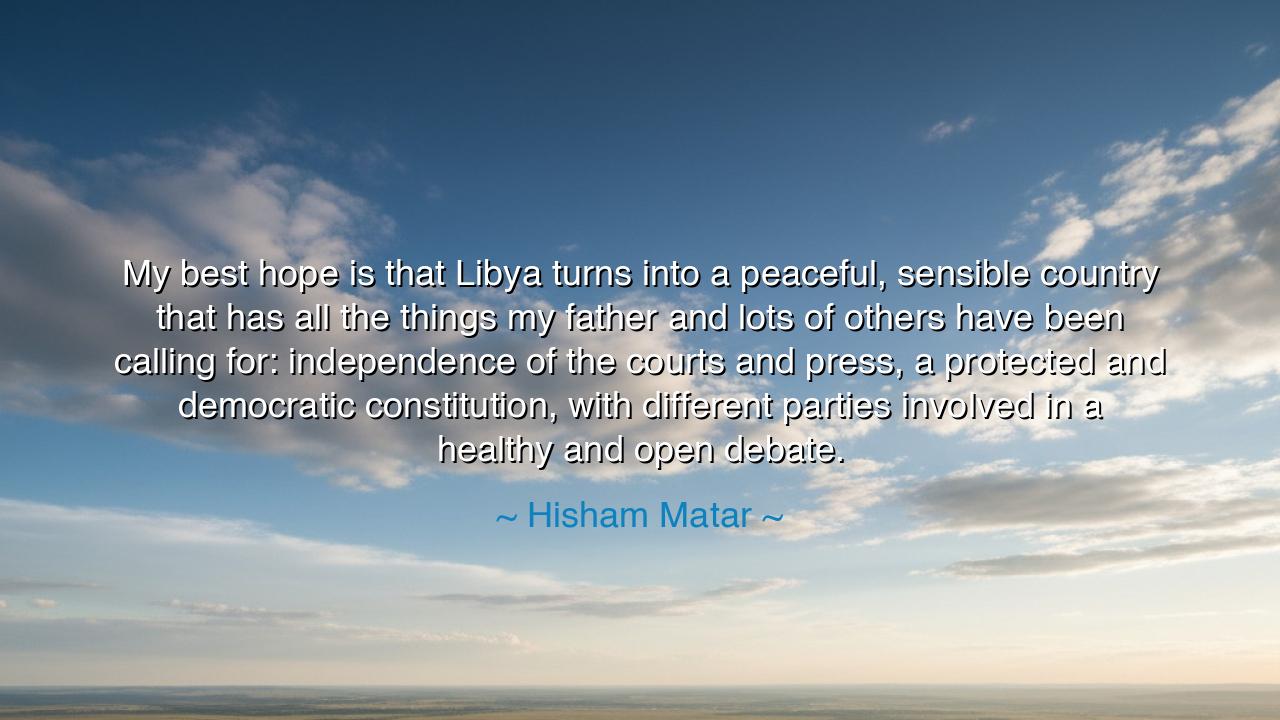
My best hope is that Libya turns into a peaceful, sensible
My best hope is that Libya turns into a peaceful, sensible country that has all the things my father and lots of others have been calling for: independence of the courts and press, a protected and democratic constitution, with different parties involved in a healthy and open debate.






The words of Hisham Matar are not merely a statement of political longing — they are a lament and a prayer born from a history of pain, exile, and hope. “My best hope is that Libya turns into a peaceful, sensible country that has all the things my father and lots of others have been calling for: independence of the courts and press, a protected and democratic constitution, with different parties involved in a healthy and open debate.” In these words, Matar speaks not only for his homeland, but for all nations that have tasted the bitterness of tyranny. His hope is both personal and universal — the cry of one who has seen how fragile freedom can be, and how sacred it is once lost.
Matar’s story is woven with sorrow and courage. His father, Jaballa Matar, was a prominent dissident who opposed the dictatorship of Muammar Gaddafi, and for his defiance, he was kidnapped in Cairo and disappeared into Libya’s dark prisons, never to be seen again. For Hisham, the struggle for freedom and justice is not an abstraction — it is the story of his own blood. When he speaks of independence of the courts and press, he speaks as one who knows what it means to live under the silence of fear, where truth is punished and lies are law. His words carry the weight of generations who dream of a country not bound by the will of one man, but guided by the voice of its people.
The independence of the courts is the heart of a just nation, for when the law bends to the ruler’s hand, tyranny is reborn in every verdict. And the freedom of the press is the breath of democracy, for without it, truth suffocates and corruption grows unchecked in the dark. Matar’s hope is not simply for political reform — it is for the rebirth of moral order, for a nation where words are no longer weapons, and justice no longer a privilege of the powerful. He dreams of a constitution — not a document of promises, but a covenant of protection between people and power. In that covenant, debate is not a threat, but a blessing; disagreement is not disloyalty, but the proof of liberty’s pulse.
History shows that such dreams are not born easily. Consider South Africa, which endured decades of apartheid before emerging into a fragile yet luminous democracy. When Nelson Mandela walked free after twenty-seven years in prison, he did not return to rule in vengeance, but to build a nation of dialogue and reconciliation. He understood, as Matar does, that true freedom is not the overthrow of an enemy, but the triumph of principle — the birth of a society where every citizen can speak, question, and participate without fear. Like Libya, South Africa’s path was marked with blood, yet its survival depended on forgiveness and faith in institutions greater than any single man.
Matar’s invocation of “different parties involved in healthy and open debate” is more profound than it appears. It is not simply a call for politics, but for pluralism — the idea that truth, like light, shines brightest when refracted through many colors. The ancient philosophers understood this well. In Athens, the cradle of democracy, the citizens gathered in the Agora to debate not just policy, but the very nature of justice, beauty, and truth. Their democracy was imperfect, as all are, but it endured because it was built on dialogue, not silence. To silence the other is to impoverish the self. Thus, in every nation’s struggle for renewal, the lesson is clear: freedom without conversation is merely a change of chains.
But Hisham Matar’s words also remind us that peace must be rooted in sense, not vengeance. A “peaceful, sensible country” is one that does not mistake chaos for liberty, nor revenge for justice. The collapse of Gaddafi’s regime brought not only relief but also turmoil, as Libya fractured into factions, each claiming the mantle of liberation. Matar’s hope — quiet yet unyielding — is for a peace guided by wisdom, where freedom is tempered by reason, and emotion gives way to institution. Such peace requires patience, forgiveness, and an unshakable faith that dialogue is stronger than the sword.
And so, the lesson carried through Matar’s words is as timeless as it is urgent: that freedom must be built on justice, and justice must be guarded by truth. A nation cannot be free until its people can speak without fear, and its courts can judge without bias. A people cannot be sovereign until they learn to listen to one another. The task before every generation — whether in Libya or beyond — is not to inherit freedom as a gift, but to construct it as a duty, stone by stone, truth by truth.
Therefore, let his words echo as both warning and wisdom: liberty is not born in war, but in understanding; not sustained by rulers, but by citizens who cherish dialogue, protect justice, and defend the independence of truth itself. The hope of one man for his homeland thus becomes a mirror for all humanity — that in every corner of the earth, people might rise to build nations worthy of their dreams: peaceful, sensible, and forever free.






AAdministratorAdministrator
Welcome, honored guests. Please leave a comment, we will respond soon